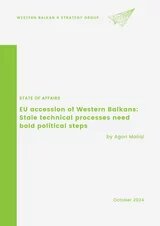position paper
EU accession of Western Balkans: Stale technical processes need bold political steps
STATE OF AFFAIRS
This article first appeared here: ba.boell.org
Product details
Date of Publication
October 2024
Publisher
WB6 Strategy Group, Heinrich Boell Stiftung
Number of Pages
7
Licence
Language of publication
English
Table of contents
- The Western Balkans have demonstrated resilience to the security risks created by
Russia’s aggression in Ukraine. But the momentum for EU enlargement of the past two
years is already starting to fade as both pull and push factors are weakening and a new
stasis is visible in the horizon.
- The Western prioritization of security and economic issues continues to embolden
authoritarian rule and to undermine the institutional reforms needed for EU accession. The
EU has become less of a transformational actor and more of transactional one preserving
the illiberal status-quo.
- The West has prioritized security over democracy but failed to fully achieve either. The
unresolved web of bilateral/ethnic disputes is keeping security issues at the forefront of
the agenda and remains a key obstacle for democratic reforms, regional integration and,
ultimately, EU accession.
- The citizens of the Western Balkans have shown resilience to warmongering rhetoric
and – considering weak or non-credible oppositions - grassroots civil society remains a
key actor challenging the status-quo. Yet civil society’s role as a catalyst for change is
hampered by it being disempowered and disillusioned with the EU. Many citizens prioritize
economic/security concerns or to choose exit (migration) over political change.
- The supporters of EU enlargement within key member states must invest serious
political capital to remove obstacles to the process and eliminate asymmetric treatment of
candidates – this is key to restoring the EU’s credibility and signaling genuine interest. - The bilateral/ethnic disputes which hold back the resolution of the security architecture
need to be resolved or tamed with a sense of urgency and resolve – the West has all the
leverage to strip regional leaders from the main weapon (i.e geopolitical blackmail)
through which they hold the region back.
- The EU needs to show moral clarity regarding democratic standards and to incentivize a
regional race towards accession on their basis – the financial envelope and other benefits
should be substantially increased and clearly tied to performance on “fundamentals”.
- If the region is to use the window of opportunity for EU enlargement, progressive and
genuine pro-democratic civil society actors and the media will have to have to be
significantly empowered to press ahead with a new vigor to disrupt the status-quo.
